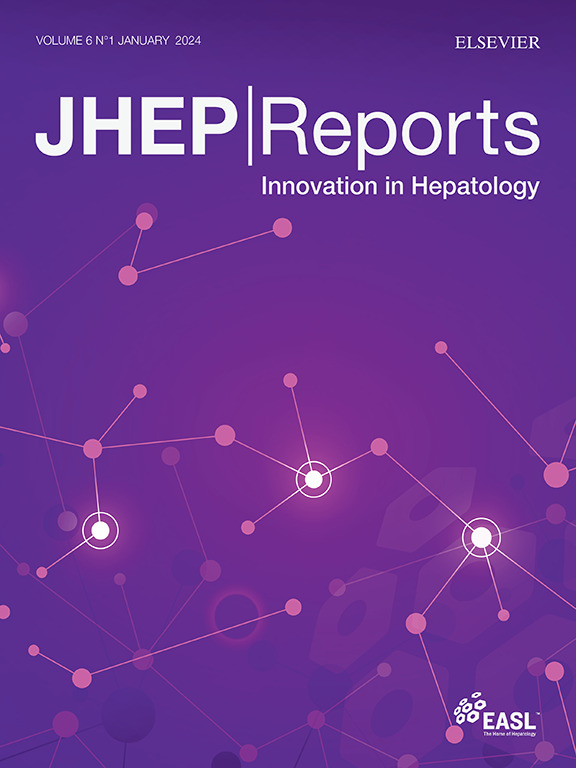Genetic risk score correlates with immune profile and risk of HCC and cirrhosis development in Hispanics with MASLD
IF 7.5
1区 医学
Q1 GASTROENTEROLOGY & HEPATOLOGY
引用次数: 0
Abstract
Background & Aims
Genetic risk score and immune dysregulations have been separately associated with the development of hepatocellular carcinoma (HCC) and cirrhosis in the context of metabolic dysfunction-associated steatotic liver disease (MASLD). Latin America has the highest prevalence of MASLD worldwide. However, the relationship between genetic risk scores, immune dysregulation, and MASLD has not been explored.
Methods
We assessed SNPs of PNPLA3 rs738409, TM6SF2 rs58542926, MBOAT7 rs641738, and HSD17B13 rs72613567 in samples from a cohort of 972 Latin American individuals (HCC = 267, non-HCC = 705). The four SNPs were later combined into a genetic risk score and calculated in patients with MASLD (cirrhotic HCC = 133, cirrhosis = 242, non-cirrhotic liver disease (NCLD) = 113). A total of 28 cytokines were analyzed in a subgroup of these samples (cirrhotic HCC = 107, cirrhosis = 111).
Results
At an individual level, only PNPLA3 GG genotype was associated with a significantly increased risk of MASLD-related HCC (odds ratio [OR]: 2.805, 95% CI: 1.083–7.264, p = 0.034) and cirrhosis (OR: 6.873, 95% CI: 3.293–14.35, p <0.001). When the four SNPs were combined into a genetic risk score, patients with a score of 6–8 had higher odds of MASLD-related HCC (OR: 3.603, 95% CI: 1.008–12.88, p = 0.049) and cirrhosis (OR: 13.12, 95% CI: 2.270–75.76, p = 0.004) compared with those with a score of 0–2. Cytokine profiles differed by genetic risk score in MASLD-related HCC and cirrhosis. Patients with HCC with high scores had lower levels of interferon-gamma and CCL8 (false discovery rate <0.05), whereas patients with cirrhosis with high scores showed higher matrix metallopeptidase 2 (MMP2) levels (false discovery rate <0.05).
Conclusions
In Latin America, genetic risk score 6–8 in patients is strongly associated with an increased risk of MASLD-related HCC and cirrhosis. Additionally, patients with HCC and cirrhosis showed distinct immune profiles across high and low genetic risk score groups.
Impact and implications
The prevalence of metabolic dysfunction-associated steatotic liver disease (MASLD)-related hepatocellular carcinoma (HCC) and cirrhosis is rising, with Hispanics having the highest MASLD rates. However, large-scale studies examining the association between genetic risk score, immune profiles, and the progression of MASLD-related HCC and cirrhosis are still lacking. In our study, we found that patients with MASLD-related HCC and cirrhosis who had higher genetic risk score were more likely to show higher odds ratios compared with those with lower genetic risk score. Additionally, genetic risk scores were found to be associated with immune profiles, as reflected by cytokine levels. These findings could assist clinicians in identifying high-risk groups of patients with MASLD-related HCC and cirrhosis and provide valuable insights into the potential immune changes in these individuals.

遗传风险评分与西班牙裔MASLD患者的免疫状况、HCC和肝硬化发展风险相关
背景和目的在代谢功能障碍相关脂肪变性肝病(MASLD)的背景下,遗传风险评分和免疫失调分别与肝细胞癌(HCC)和肝硬化的发生相关。拉丁美洲是全球MASLD患病率最高的地区。然而,遗传风险评分、免疫失调和MASLD之间的关系尚未探讨。方法我们评估了972例拉丁美洲个体(HCC = 267,非HCC = 705)样本中PNPLA3 rs738409、TM6SF2 rss58542926、MBOAT7 rs641738和HSD17B13 rs72613567的snp。随后将这4个snp合并成遗传风险评分,并在MASLD患者(肝硬化HCC = 133,肝硬化= 242,非肝硬化肝病(nld) = 113)中计算。在这些样本的一个亚组中,共分析了28种细胞因子(肝硬化HCC = 107,肝硬化= 111)。结果在个体水平上,只有pnpla3gg基因型与masld相关的HCC(比值比[OR]: 2.805, 95% CI: 1.083-7.264, p = 0.034)和肝硬化(比值比[OR]: 6.873, 95% CI: 3.293-14.35, p <0.001)的风险显著增加相关。当4个snp合并成遗传风险评分时,与评分为0-2的患者相比,评分为6-8的患者发生masld相关HCC (OR: 3.603, 95% CI: 1.008-12.88, p = 0.049)和肝硬化(OR: 13.12, 95% CI: 2.270-75.76, p = 0.004)的几率更高。在masld相关的HCC和肝硬化中,细胞因子谱因遗传风险评分不同而不同。HCC评分高的患者干扰素- γ和CCL8水平较低(假发现率<;0.05),而肝硬化评分高的患者基质金属肽酶2 (MMP2)水平较高(假发现率<;0.05)。结论在拉丁美洲,患者的遗传风险评分为6-8分与masld相关的HCC和肝硬化的风险增加密切相关。此外,HCC和肝硬化患者在高和低遗传风险评分组中表现出不同的免疫特征。影响和意义代谢功能障碍相关脂肪变性肝病(MASLD)相关肝细胞癌(HCC)和肝硬化的患病率正在上升,其中西班牙裔的MASLD发病率最高。然而,关于遗传风险评分、免疫谱与masld相关HCC和肝硬化进展之间关系的大规模研究仍然缺乏。在我们的研究中,我们发现与遗传风险评分较低的患者相比,遗传风险评分较高的masld相关HCC和肝硬化患者更有可能显示更高的优势比。此外,遗传风险评分被发现与免疫特征相关,这反映在细胞因子水平上。这些发现可以帮助临床医生识别与masld相关的HCC和肝硬化患者的高危人群,并为这些个体潜在的免疫变化提供有价值的见解。
本文章由计算机程序翻译,如有差异,请以英文原文为准。
求助全文
约1分钟内获得全文
求助全文
来源期刊

JHEP Reports
GASTROENTEROLOGY & HEPATOLOGY-
CiteScore
12.40
自引率
2.40%
发文量
161
审稿时长
36 days
期刊介绍:
JHEP Reports is an open access journal that is affiliated with the European Association for the Study of the Liver (EASL). It serves as a companion journal to the highly respected Journal of Hepatology.
The primary objective of JHEP Reports is to publish original papers and reviews that contribute to the advancement of knowledge in the field of liver diseases. The journal covers a wide range of topics, including basic, translational, and clinical research. It also focuses on global issues in hepatology, with particular emphasis on areas such as clinical trials, novel diagnostics, precision medicine and therapeutics, cancer research, cellular and molecular studies, artificial intelligence, microbiome research, epidemiology, and cutting-edge technologies.
In summary, JHEP Reports is dedicated to promoting scientific discoveries and innovations in liver diseases through the publication of high-quality research papers and reviews covering various aspects of hepatology.
 求助内容:
求助内容: 应助结果提醒方式:
应助结果提醒方式:


